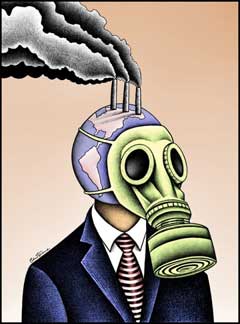Nov 15, 2019
Climate Change Deniers: Do They Exist?
Taken literally, climate change deniers do not exist. Virtually no one this side of flat-earthers denies that the climate changes over time. The term “denier” seems to be a feeble attempt at argumentum ad hominem, implying some relationship to holocaust denial. However, a rejection of science can reasonably be considered denial.
Most of the so-called deniers are actually questioning specific scientific questions, such as: What is the feedback factor for a doubling of CO2 in earth’s atmosphere? “Skeptic” would seem to be a more accurate an objective term for those who disagree with the IPCC estimation of this critical feedback multiplier.
There is a tendency among some environmentalists to broaden “denier” to include, not only those who disagree with the so-called climate consensus, but also those who agree with the consensus but do not favor sufficiently active (drastic) policy measures. This is a clear misnomer. Yet, there is not yet any consensus term for these science-respecting skeptics of climate alarmism. In popular media, they are mixed in with nescient deniers of man-made climate change. There follows my suggested terms for all four major positions.
Three Critical Questions
The main climate change positions can be summarized with the following questions:
- Is the climate changing?
- Is mankind a measurable cause of climate change?
- Is climate change likely to be catastrophic if drastic measures are not taken?
The first question is about literal climate change. Does the climate change over time? This is (almost) a giveaway, because almost no one answers “no.” Most people know that in the remote past there was an Ice Age. Some have heard of the Medieval Warm Period around 1000AD or the Little Ice Age in the 1700s. Question one is basically proof that literal climate change deniers do not exist, except as anomalies.
The second question is about anthropogenic climate change. Has mankind had an effect on climate change? Many people have heard of desertification, perhaps of lost ancient forests and the Cedars of Lebanon, or the increase in size of the Sahara. Land use by mankind, such as deforestation and industrial farming, also provide evidence of anthropogenic climate change. Yet, surprisingly, many people answer “no” to question two. Possibly they are focusing on greenhouse gasses rather than deforestation and land use, though the evidence for greenhouse gasses having a measurable effect on climate is also strong.
Suggested Nomenclature for Positions
The three questions are arranged such that, once a “no” answer is given, one is very likely to choose “no” for the succeeding questions. While this is generally the case, it is conceivable that someone may answer #2 with “no” but answer #3 with “yes,” for example if they see an asteroid hurtling toward earth. For most people, however, a “no” will signal the end of agreement. With this in mind, there are four main positions.
- Nnn - climate change denier
- YNn - anthropogenic climate change denier
- YYN - climate change realist
- YYY - climate change alarmist
The Nnn is a literal climate change denier. These people are very rare, if they exist at all. Some people have said that they are climate change deniers, but upon examination what they mean by “climate change,” in context, is: “the theory or belief that climate change is an impending catastrophe.” In other words, one must account for the unfortunate fact that “climate change” can mean two quite different things - literal climate change or an alarmist theory about climate change.
YNn is someone who agrees that climate change occurs, but denies that mankind has had any measurable effect on climate. In other words, all significant inputs to earth’s climate are astronomical, geologic, and “natural.” Since land use has had an effect on climate, this position seems unscientific - a rather ignorant rejection of evidence regarding deforestation and desertification. The term anthropogenic climate change denier is appropriate. Quite possibly, many of the people in this category suffer from identity politics and confirmation bias.
YYN is someone who recognizes the reality of man-made climate change, but does not think it is a crisis or emergency. This person agrees with the scientific consensus part 4 that “people and nations can act individually and collectively to slow the pace of global warming” and ameliorate the effects of climate change. This might be called the harm reduction approach rather than the prohibition approach. YYN’s are aptly named “climate change realists.”

YYY is a person who, like YYN, accepts the scientific facts and consensus about climate change, but in addition makes the unscientific value judgement that an impending crisis, an emergency, exists. The YYY is a climate alarmist, and uses hyperbolic language such as “extinction level event,” to dramatize his or her concern. The climate alarmist is more accepting and rational about the science of climate change, but confuses scientific facts with value judgements. Furthermore, alarmists tend to confuse projections with forecasts, perhaps due to confirmation bias. The IPCC projections are not forecasts, and were not intended by the scientists who created them to be forecasts. As forecasts, they fail miserably. But most alarmists are totally unaware of this, and cite these “what if” scenarios as if they reflect reality in some way.
My informal Facebook polls show that no one is a climate change denier, many are anthropogenic climate change deniers, a few are climate change realists, and many are climate alarmists. One might ask why, instead of a more normal distribution, there are two humps. Why are most people YNn or YYY, with relatively few taking the rational and scientific climate realist YYN position? My conjecture is that identity politics pulls people to the YNn and YYY positions. Those who favor limited government action (except for war, and drugs, and immigration …) known as conservatives, tend to ignore the scientific facts regarding man’s effect on climate, since the alarmists are correctly perceived to want a massive increase in government power to address the issue. On the other hand, those who favor “active” government, known as progressives, liberals, or watermelons, tend to misinterpret science in a value-laden manner since their remedies require aggressive government action. Identitarian cognitive biases make both groups stupider.
Anthropological climate change deniers (YNn) are unscientific in their rejection of science, while climate alarmists (YYY) are unscientific in their irrational scientism - their belief that science answers value questions regarding ethics and policy. Science cannot declare a crisis. Humans can, using scientific data and theory, argue that a crisis exists. Climate alarmists often resort to a Motte and Bailey argument that fallaciously confuses consensus climate science with Chicken Little alarmism. The rational middle, the climate realist position, should be the consensus - and probably would be if not for the tribalism of partisan politics.
